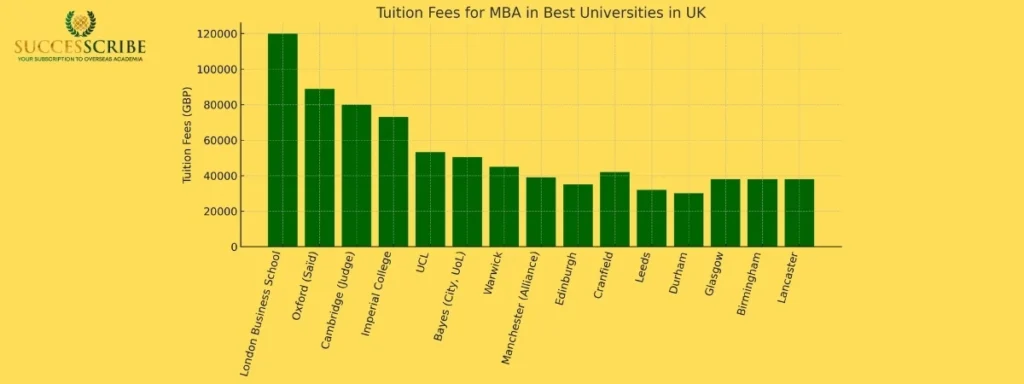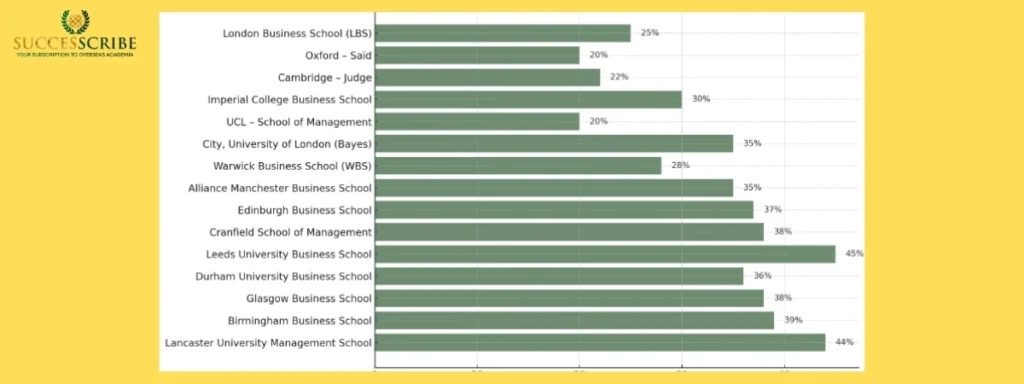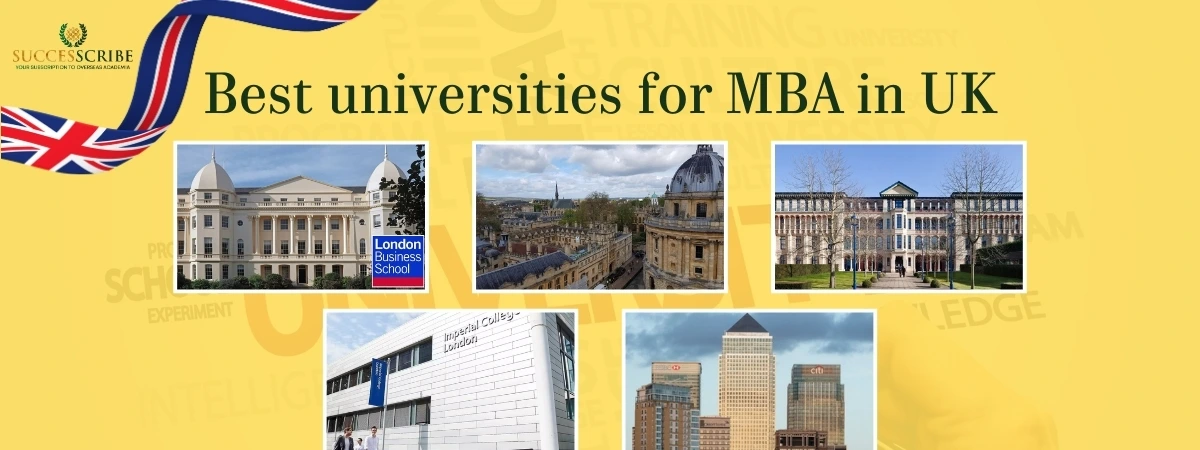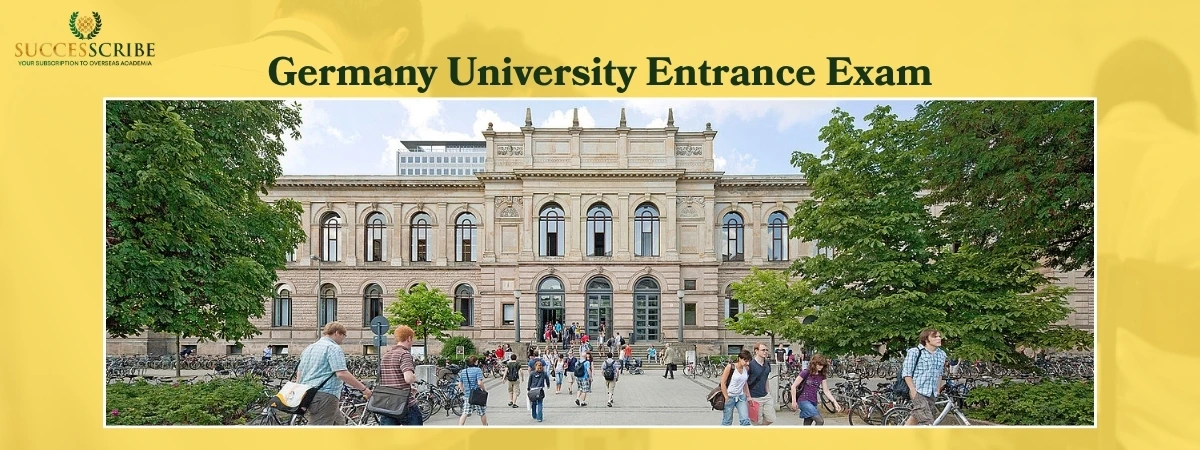Pursuing a Master of Business Administration (MBA) in the United Kingdom is a transformative step for aspiring business leaders, offering world-class education, global exposure, and exceptional career opportunities. The UK is home to some of the most prestigious business schools, known for their rigorous academic standards, innovative teaching methods, and strong industry connections. The best universities for MBA in UK combine world-class faculty, global networking, and innovative teaching methods, making them a top destination for ambitious professionals.
Key Highlights
- Top Universities: Home to globally ranked business schools like London Business School, Oxford Saïd, and Cambridge Judge.
- Global Recognition: UK MBAs are recognized worldwide, enhancing career opportunities across industries.
- Acceptance Rates: Competitive admissions, with top schools like Oxford and Cambridge having 20–22% acceptance rates.
- Costs: Tuition fees range from £30,000 – £90,000 depending on the university.
- ROI: Graduates see average post-MBA salaries between £75,000 – £110,000, with higher potential in consulting and finance.
- Work Opportunities: 2-year post-study work visa under the Graduate Route enhances job prospects.
- Networking: Strong alumni networks and exposure to London’s global business hub.
Why Study MBA in UK?
The UK is one of the top three global destinations for MBA aspirants, alongside the USA and Canada, and continues to attract thousands of international students each year. According to the Higher Education Statistics Agency (HESA) 2024, over 500,000 international students were enrolled in UK higher education, with business and management being the most popular field, accounting for 19% of total enrollments.
- The UK is home to 4 business schools ranked in the Financial Times Global MBA Rankings 2025 Top 20, including London Business School, Oxford Saïd, Cambridge Judge, and Imperial College Business School.
- Most MBA programs in the UK last 12 months, compared to 24 months in the USA.
- A Graduate Management Admission Council (GMAC) 2024 survey reported that 92% of UK MBA graduates found employment within 3 months of graduation.
- Over 60% of MBA students in the UK are international, creating a multicultural learning environment. Choosing the best universities for MBA in UK means accessing programs that rank consistently in the top 50 globally and attract over 120,000 international students each year.
- London alone is home to over 250 foreign banks and 500 multinational company headquarters, offering MBA graduates direct access to high-paying jobs.
- The average post-MBA salary in the UK is £83,000 per year, with London Business School graduates earning an average of £109,000 annually.
- The UK Graduate Route Visa allows international MBA graduates to stay and work in the UK for 2 years (3 years for PhD students) after completing their degree.
Top 15 MBA Colleges in the UK for 2025
The 15 best universities for MBA in UK offer a mix of prestigious names like Oxford, Cambridge, and LBS, alongside rising institutions that provide excellent ROI for international students. Below are tables for each of the top 15 UK universities offering MBA programs, Global MBA Rankings, Financial Times rankings, and appeal to international students.
1. London Business School (LBS)
| Attribute | Details |
| Global Ranking | #5 (Financial Times 2025) |
| Program Duration | 15, 18, or 21 months |
| Work Experience Required | 2–5 years |
| Average GMAT Score | 708 |
| Notable Highlights | 92% employment rate within 3 months post-graduation |
2. University of Oxford (Saïd Business School)
| Attribute | Details |
| Global Ranking | #10 (FT Global MBA Rankings) |
| Program Duration | 12 months |
| Work Experience Required | Minimum 2 years |
| Average GMAT Score | 690 |
| Notable Highlights | 95% employed within 3 months, Oxford alumni network of 200,000+ |
3. University of Cambridge – Judge Business School
| Attribute | Details |
| Global Ranking | #13 (FT Global MBA Rankings 2025) |
| Program Duration | 12 months |
| Work Experience Required | Minimum 2 years |
| Average GMAT Score | 690 |
| Notable Highlights | 90% employed within 3 months, strong focus on innovation and startups |
4. Imperial College Business School
| Attribute | Details |
| Global Ranking | #20 (FT Global MBA Rankings 2025) |
| Program Duration | 12 months |
| Work Experience Required | Minimum 3 years |
| Average GMAT Score | 680 |
| Notable Highlights | 95% of students secure employment within 6 months |
5. University College London (UCL) – School of Management
| Attribute | Details |
| Global Ranking | #25 (FT Global MBA Rankings 2025) |
| Program Duration | 12 months |
| Work Experience Required | Minimum 3 years |
| Average GMAT Score | 650 |
| Notable Highlights | Collaboration with London industries, international cohort |
6. Bayes Business School (City, University of London)
| Attribute | Details |
| Global Ranking | Top 50 globally |
| Program Duration | 12 months |
| Work Experience Required | Minimum 5 years |
| Average GMAT Score | 660 |
| Notable Highlights | Strong industry connections in finance and consulting sectors |
7. Warwick Business School
| Attribute | Details |
| Global Ranking | #19 (FT Global MBA Rankings 2025) |
| Program Duration | 12 months |
| Work Experience Required | Minimum 3 years |
| Average GMAT Score | 660 |
| Notable Highlights | 90% employment rate within 3 months |
8. Alliance Manchester Business School
| Attribute | Details |
| Global Ranking | #30 (FT Global MBA Rankings 2025) |
| Program Duration | 12 months |
| Work Experience Required | Minimum 3 years |
| Average GMAT Score | 630 |
| Notable Highlights | Focus on global business and leadership development |
9. University of Edinburgh Business School
| Attribute | Details |
| Global Ranking | Top 50 globally |
| Program Duration | 12 months |
| Work Experience Required | Minimum 3 years |
| Average GMAT Score | 620 |
| Notable Highlights | Strong focus on leadership and strategic management |
10. Cranfield School of Management
| Attribute | Details |
| Global Ranking | Top 50 globally |
| Program Duration | 12 months |
| Work Experience Required | Minimum 3 years |
| Average GMAT Score | 630 |
| Notable Highlights | Focus on practical business applications and industry partnerships |
11. Leeds University Business School
| Attribute | Details |
| Global Ranking | Top 100 globally |
| Program Duration | 12 months |
| Work Experience Required | Minimum 3 years |
| Average GMAT Score | 620 |
| Notable Highlights | Focus on strategic management and leadership |
12. Durham University Business School
| Attribute | Details |
| Global Ranking | Top 100 globally |
| Program Duration | 12 months |
| Work Experience Required | Minimum 3 years |
| Average GMAT Score | 610 |
| Notable Highlights | Focus on international business and leadership |
13. University of Glasgow Business School
| Attribute | Details |
| Global Ranking | Top 100 globally |
| Program Duration | 12 months |
| Work Experience Required | Minimum 3 years |
| Average GMAT Score | 610 |
| Notable Highlights | Emphasis on leadership and global business |
14. University of Birmingham Business School
| Attribute | Details |
| Global Ranking | Top 100 globally |
| Program Duration | 12 months |
| Work Experience Required | Minimum 3 years |
| Average GMAT Score | 610 |
| Notable Highlights | Focus on leadership, strategy, and global business |
15. Lancaster University Management School
| Attribute | Details |
| Global Ranking | #100–110 globally |
| Program Duration | 12 months (full-time) |
| Work Experience Required | Minimum 3 years of professional/managerial experience |
| Average GMAT Score | Not mandatory, but can strengthen application – 610 |
| Notable Highlights | 92% Employment Rate, Leadership practice, corporate projects, personal development coaching |
Suggested Post: Executive MBA in Germany
Tuition Fees of Top 15 MBA Colleges in UK

The tuition fees at the best universities for MBA in UK vary from £30,000 to £97,500, depending on the program’s reputation and global ranking. Fees are a major investment and increase annually. The figures below are approximations for the full-time program. Always confirm directly with the university.
| University | Tuition Fees (GBP) |
| London Business School | £119,950 |
| University of Oxford (Saïd Business) | £88,800 |
| University of Cambridge (Judge) | £80,000 |
| Imperial College Business School | £73,000 |
| University College London (UCL) | £53,203 |
| Bayes Business School (City, UoL) | £50,400 |
| Warwick Business School | £44,950 |
| Alliance Manchester Business School | £39,000 |
| University of Edinburgh Business | £35,000 |
| Cranfield School of Management | £42,000 |
| Leeds University Business School | £32,000 |
| Durham University Business School | £30,000 |
| University of Glasgow Business School | £38,000 |
| University of Birmingham Business School | £38,000 |
| Lancaster University | £38,000 |
Suggested Post: Cost of MBA in Germany
Admission Criteria for MBA in the UK
Admission to UK MBA programs is competitive, with specific requirements varying by institution. Below are the general eligibility criteria for international students, particularly Indian students:
- Academic Qualifications: A bachelor’s degree from a recognized institution with a minimum GPA of 3.0–3.5 (equivalent to a UK 2:1, or 60–65% aggregate).
- Work Experience: Most top-tier programs require 2–5 years of full-time professional experience. Executive MBAs may demand 5–12 years, while some universities accept fresh graduates.
- Standardized Tests: A GMAT score of 600–730 or a GRE score of 314+ is typically required, though some schools waive this for candidates with strong academic or professional backgrounds.
- English Proficiency: International students must demonstrate proficiency through:
| Test Name | Score Required |
| IELTS | 6.5–7.0 overall (no band below 6.0) |
| TOEFL iBT | 90–100 |
| PTE Academic | 62–70 |
Some programs accept Duolingo English Test (DET) scores of 120+.
- Supporting Documents:
- Statement of Purpose (SOP): A 500-word essay detailing career goals, leadership experience, and reasons for choosing the program.
- Letters of Recommendation (LORs): 1–3 professional or academic LORs (academic LORs not accepted if only one is required).
- Resume/CV: Highlighting work experience and achievements.
- Academic Transcripts: Official records from previous institutions.
- Interviews: Many schools conduct interviews to assess leadership potential, motivation, and fit with the program.
MBA Acceptance Rates in the UK

The acceptance rate at the best universities for MBA in UK ranges between 10–25%, reflecting their highly competitive and selective nature. Getting into an MBA program in the UK is competitive, but the level of selectivity varies across universities. Top business schools such as London Business School (LBS) and Oxford Saïd Business School admit only a small percentage of applicants, while universities like Durham, Birmingham, and Lancaster are more flexible, offering higher acceptance rates.
Acceptance rates depend on factors such as:
- Academic background
- Work experience (quality and years)
- GMAT/GRE or equivalent test scores
- Essays, interviews, and references
Diversity quotas (nationality, gender balance, and professional background)
MBA Acceptance Rates at Top UK Universities
| University / Business School | Approx. MBA Acceptance Rate | Notes |
| London Business School (LBS) | 25% | Slightly higher intake but extremely competitive; GMAT median 700. |
| University of Oxford – Saïd Business School | 20% | Very competitive; strong academics, GMAT 690+, and 5+ years of work experience often needed. |
| University of Cambridge – Judge Business School | 22% | Highly selective; strong leadership profile and international exposure required. |
| Imperial College Business School | 30% | Prior quantitative/tech background helps; 3–5 years of work experience expected. |
| University College London (UCL) – School of Management | 20% | Based on broader business & management |
| City, University of London (Bayes Business School) | 35% | Competitive due to London location; finance & consulting applicants face higher scrutiny. |
| Warwick Business School (WBS) | 28% | Selective; emphasis on GMAT (average -660) and professional achievements. |
| Alliance Manchester Business School | 35% | More flexible; values diverse industry backgrounds. |
| University of Edinburgh Business School | 37% | Slightly higher acceptance; focuses on global outlook and leadership traits. |
| Cranfield School of Management | 38% | Practical leadership and management experience is a major factor. |
| Leeds University Business School | 45% | Leeds accepts about 45.34% of applicants – making it more accessible than many peers. |
| Durham University Business School | 36% | Competitive but accessible; international students form 60%+ of cohort. |
| University of Glasgow Business School | 38% | Focuses on strong academic foundations and professional experience. Benefits from the University of Glasgow’s strong reputation and historic brand. |
| University of Birmingham – Birmingham Business School | 39% | Looks for evidence of career progression and international perspective. As a Russell Group university, it values strong academics but is more holistic in its review process. |
| Lancaster University Management School | 44% | Welcomes international students; focuses on career progression and leadership skills. |
Requirement of Work Experience for Best Universities for MBA in UK
Unlike many Master’s programs, an MBA is not an extension of academic study. It is a post-experience qualification. The classroom pedagogy relies on participants contributing insights from their professional lives. Therefore, work experience is not just a checkbox; it is the fuel for the learning process.
- Typical Requirement: Top UK MBA programs expect a minimum of 3 years of full-time, post-graduation professional work experience. However, the average at top schools is often between 5 and 7 years.
- Quality over Quantity: Admissions teams look for evidence of career progression, leadership potential (even if not in a formal management role), and tangible impact. A candidate with 5 years of rapid promotion and increasing responsibility is far more compelling than one with 7 years of static performance.
- Diversity of Experience: Schools actively seek candidates from diverse sectors, non-profit, military, engineering, healthcare, etc., to enrich classroom discussions.
- Executive MBA (EMBA): These programs are designed for senior professionals and typically require 8+ years of experience, including significant managerial responsibility.
Exams Required for MBA in the UK

To gain admission to the best universities for MBA in UK, applicants generally need strong GMAT/GRE scores along with proof of English proficiency through IELTS or TOEFL. Most UK MBA programs require standardized test scores:
| Exam Type | Purpose | Typical Competitive Score (Top Tier) | Notes |
| GMAT | Assess quantitative, verbal, analytical, and integrated reasoning skills | 650 – 690+ | Still the gold standard for many finance-focused programs. A score above 700 is highly competitive. |
| GRE | Assess verbal reasoning, quantitative reasoning, and analytical writing. | 320+ | Increasingly accepted as an equal alternative to the GMAT. Check individual school policies. |
| IELTS | Proof of English proficiency for non-native speakers. | 7.0 – 7.5 overall | Must often meet minimum sub-scores (e.g., 6.5/7.0 per band). |
| TOEFL iBT | Proof of English proficiency for non-native speakers. | 100 – 110 | For Top Tier Universities (above 110) |
Suggested Post: GMAT score for MBA in Germany
Career Opportunities After an MBA in the UK
Graduates from the best universities for MBA in UK secure roles in consulting, finance, and technology, with average post-MBA salaries often exceeding £85,000 per year. A UK MBA opens doors globally, but many graduates leverage the Graduate Route visa to gain work experience in the UK or Europe.
Top Sectors Hiring MBA Graduates:
- Consulting: The top destination. Major firms (MBB: McKinsey, BCG, Bain; Big Four: PwC, Deloitte, EY, KPMG) actively recruit from top UK schools for their London and global offices.
- Finance & Banking: A traditional strength. Roles in investment banking, private equity, venture capital, asset management, and fintech are plentiful, especially in London.
- Technology: The fastest-growing sector. Major tech giants (Amazon, Google, Meta, Apple, Microsoft) and countless scale-ups and startups hire MBAs for product management, business development, marketing, and strategy roles.
- Healthcare & Pharmaceuticals: Given the strength of schools like Imperial and the presence of global pharma HQs, this is a major sector for MBAs interested in healthcare management and strategy.
- Consumer Goods & Retail: Companies like Unilever, Diageo, and Reckitt have strong leadership development programs that recruit MBAs.
Average Salaries After MBA in the UK
MBA graduates from UK business schools enjoy attractive salary packages, especially those from top-tier institutions. Salaries, however, vary by specialization, sector, and location.
| University | Average Post-MBA Salary (GBP) | Popular Recruiting Sectors |
| London Business School | £90,000 – £110,000 | Consulting, Finance, Tech |
| Oxford (Saïd) | £80,000 – £95,000 | Consulting, Finance, Startups |
| Cambridge (Judge) | £75,000 – £92,000 | Finance, Consulting, Healthcare |
| Imperial College | £70,000 – £90,000 | Tech, Consulting, Energy |
| Warwick | £65,000 – £85,000 | Supply Chain, Consulting, Finance |
| Manchester | £65,000 – £80,000 | Consulting, Retail, Healthcare |
| Edinburgh | £60,000 – £75,000 | Marketing, Tech, Consulting |
| Cranfield | £65,000 – £78,000 | Aerospace, Logistics, Manufacturing |
| Durham | £58,000 – £70,000 | Consulting, Finance |
| Birmingham | £55,000 – £68,000 | Management, Banking |
| Brunel | £45,000 – £55,000 | SMEs, Retail, Consulting |
Scholarships for International Students Pursuing MBA in the UK

Financing an MBA in the UK can be a significant investment, especially for international students. Fortunately, a wide range of scholarships, fellowships, and funding opportunities are available that can substantially reduce tuition costs and living expenses. The best universities for MBA in UK provide generous scholarships ranging from £10,000 to £30,000, making world-class education more affordable for global talent. These scholarships are offered by the UK government, universities, and private organizations, rewarding students for academic excellence, leadership potential, and professional achievements.
1. UK Government & National Scholarships
Chevening Scholarships
- Funded by the UK government’s Foreign, Commonwealth & Development Office (FCDO).
- Covers full tuition fees, travel costs, and living allowances.
- Awarded to students from over 160 countries, focusing on future leaders.
- Highly competitive with 5% acceptance rate.
GREAT Scholarships
- Joint initiative by the UK government and partner universities.
- Provides £10,000 towards tuition fees for 1-year master’s programs, including MBAs.
- Open to students from 15+ eligible countries such as India, China, Malaysia, and others.
2. University-Specific MBA Scholarships
Many UK business schools offer merit-based and need-based scholarships exclusively for MBA students.
| University | Scholarship Name | Coverage / Amount |
| London Business School (LBS) | LBS Fund Scholarship, Laidlaw Women’s Leadership Fund | Partial to full tuition waivers; some awards up to £30,000 |
| Oxford Saïd Business School | Skoll MBA Scholarship | Covers full tuition (£88,800) + living costs for students passionate about social entrepreneurship |
| Cambridge Judge Business School | Cambridge MBA Scholarship, Sainsbury Management Fellowships | Awards ranging from £10,000 to full tuition |
| Imperial College Business School | Dean’s Impact Scholarship | Up to £25,000, awarded for excellence in innovation, sustainability, and leadership |
| Warwick Business School | WBS MBA Scholarships | Merit-based, covering up to 50% of tuition fees |
| Alliance Manchester Business School | Manchester MBA Scholarships | £10,000 – £20,000 based on academic merit and leadership potential |
| Cranfield School of Management | Cranfield MBA Scholarship for Women Leaders | Up to £14,000 |
| Durham University Business School | Dean’s Scholarships for International Students | Covers up to 50% tuition |
| University of Edinburgh Business School | MBA Achievement Scholarships | £5,000 – £10,000 partial awards |
3. Private & External Scholarships
- Commonwealth Scholarships – Offered to students from Commonwealth countries; usually covers full tuition and airfare.
- Inlaks Shivdasani Foundation Scholarships (for Indian students) – Up to US $100,000 for tuition and living expenses.
- Fulbright Postgraduate Awards – For US students applying to UK programs, covering tuition and stipends.
- British Council Women in STEM Scholarships – For female candidates pursuing MBAs with a STEM/business focus.
Suggested Post: how to get scholarship to study abroad
Visa Requirements for International Students
Enrolling at the best universities for MBA in UK ensures eligibility for a Graduate Route visa, allowing international students to work for up to 2 years after graduation. To study in the UK, international students typically require a Student Visa. Key requirements include:
- Confirmation of Acceptance for Studies (CAS): Issued by the university upon acceptance.
- Proof of Financial Means: Demonstrating the ability to cover tuition fees and living expenses.
- English Language Proficiency: An IELTS score of 6.5 or higher.
- Application Fee: Approximately £348.
- Healthcare Surcharge: Around £470 per year
The application process can take up to three weeks, so it’s advisable to apply well in advance.
Conclusion
Choosing the best universities for MBA in UK is not just about rankings, but about the value, outcomes, and opportunities they provide. With over 130 universities offering MBA programs, and 15 world-leading business schools ranking among the top globally, the UK remains a powerhouse for management education. The combination of 1-year MBA programs, access to a network of 650,000+ international students, and career opportunities where average MBA graduates earn between £70,000–£120,000 per year, makes the UK an unparalleled destination.
FAQs
Is an MBA in the UK worth it compared to the USA or Canada?
Yes. The UK offers 1-year MBA programs at world-class universities, which reduces both tuition and living costs compared to the US (2 years). You also get faster entry into the job market with equally strong global recognition.
Which are the best universities for MBA in the UK for international students?
Top names include London Business School, University of Oxford (Said), University of Cambridge (Judge), Imperial College London, Warwick Business School, and Manchester Business School. These universities consistently rank in the global top 50 MBAs.
What is the average cost of an MBA in the UK for Indian students?
On average, tuition fees range between £30,000–£90,000 (₹27–83 lakh). Living expenses add around £12,000–£15,000 per year (₹11–14 lakh). Many scholarships and part-time work options help reduce the burden.
Do UK universities require GMAT for MBA admissions?
Not always. While top universities like LBS, Oxford, Cambridge prefer GMAT, many others accept work experience, GRE scores, or even waive GMAT if your profile is strong.
Can international students work while studying MBA in the UK?
Yes. You can work up to 20 hours per week during term time and full-time during holidays. Many MBA students also take internships or consulting projects during the course.
Related Post
Example of LOR for study abroad
Benefits of German language course
German language scope in India
Technical University of Munich















